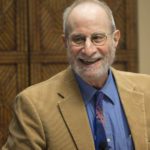By Dr. Joseph Chuman

As many who have heard my platform addresses over the years might conclude, I am an avid consumer of the “The New York Times.”In fact, I have been reading the Times(paper edition)since I was 12 and continue to do so, time permitting, seven days a week. The philosopher Morris Raphael Cohen had once likened reading the newspaper to the modern person’s equivalent of prayer. And so it is for me, a daily, ingrained, and somewhat ritualized habit.
Having made this confession, I make no claims that “The New York Times” dispenses divine truths or even objectively reports the news. I believe that values and perspectives must by necessity govern news-gathering and how news is communicated, and objectivity is an ideal that eludes our grasp. But in this era of “alternative facts” and conspiracy theories, and when regard for truth is thrown to the winds, I conclude that traditional, mainline publications sustain a mien of seriousness and remain committed to honest reporting. And in these times, such commitments, lamentably, are not small things and are refreshing. They are also anchorages that provide refuge while the maelstrom of mendacity and chaos swirls around us.
Like many readers of the Times, I have my favorite op-ed columnists, and those I like and which columns impress me most become a topic of conversation among friends. Last week a column by Michelle Goldberg, whose opinions I often find insightful, especially caught my attention. Titled “Democracy Grief Is Real,” Goldberg provided anecdotes of how the erosion of the traditional moorings that have sustained our political environment is affecting our personal lives, manifested in anger, anxiety, and despair. These emotions are expressed in conversations among friends and in the offices of psychotherapists. Speaking for herself, she writes,
“Lately, I think I’m experiencing democracy grief. For anyone who was, like me, born after the civil rights movement finally made democracy in America real, liberal democracy has always been part of the climate, as easy to take for granted as clean air or the changing of the seasons. When I contemplate the sort of illiberal oligarchy that would await my children should Donald Trump win another term, the scale of the loss feels so vast that I can barely process it.”
Some might argue that, looking at the larger picture, things have always been the same, that Trumpism is merely an instance of the encompassing realities of a capitalistic system of the strong dominating the weak.
I don’t accept this analysis. I think something is different this time that is worthy of a heightened concern, and the despair felt by many is rooted in realities that threaten the future of freedom and democracy. Michelle Goldberg points to this difference when she notes:
“Obviously, this is hardly the first time that America has failed to live up to its ideals. But the ideals themselves used to be a nearly universal lodestar. The civil rights movement, and freedom movements that came after it, succeeded because the country could be shamed by the distance between its democratic promises and its reality. That is no longer true.”
I believe this is exactly right. Martin Luther King militantly critiqued the racism of his time, but he did so noting how America had defaulted on its founding promise articulated in the Declaration of Independence. The counter-culture of the 1960s, of which I was an exponent, may have celebrated its zeal in tearing down “the establishment,” but the youth of my era were still nurtured on the liberal values of the American Idea by which they were socialized. The new world we were purportedly creating would not be much different from an idealized one we claimed we were destroying.
At bottom, among radicals and establishment-arians there was a shared language and shared values, which, in a broad sense, were the values that undergird liberal government. With Trump and his followers, this baseline, shared vocabulary and universe of common values has been shattered, and the consequences are very despairing.
But despair cannot be an end point, and so the necessary question arises “What to do?” What actions can we take to not only change the larger picture but to free ourselves from the despair, fear, and anxiety that hang over us and darken our personal lives?
I plan to engage these highly relevant questions in my first address of the new decade, “When the Political Becomes Personal: Despair and Hope in Trying Times.” I wish you a pleasant—and hopeful— new year!
Dr. Joseph Chuman is leader of the Ethical Culture Society of Bergen County.


